
Food After Delivery: Indian Diet Plan for New Mothers’ Fast Recovery
Delivery ke baad right food mother ki recovery aur baby ke nourishment ke liye zaruri hota hai. Jaane best Indian food after delivery diet plan.
Read More
Delivery ke baad right food mother ki recovery aur baby ke nourishment ke liye zaruri hota hai. Jaane best Indian food after delivery diet plan.
Read More
Delivery ke baad post pregnancy diet recovery aur lactation ke liye essential hoti hai. Jaane kya khayein, kya avoid karein aur best Indian foods.
Read More
Ajwain Laddu post-pregnancy digestion aur recovery ke liye ek traditional Ayurvedic food hai jo gas, bloating kam karta hai aur lactation ko naturally support karta hai.
Read More
Gond Laddu post-pregnancy recovery ke liye ek traditional Ayurvedic food hai jo strength, warmth aur nourishment provide karta hai new mothers ko after delivery.
Read More
Breastfeeding ke dauran mother kya khaye? Jaane food for breastfeeding mothers jo milk quality improve kare, baby digestion support kare aur mother ko strength de.
Read More
Lactation food for mothers breastfeeding ke dauran bahut important hota hai. Jaane kaunse Indian aur Ayurvedic foods breast milk badhate hain aur kya avoid karna chahiye.
Read More
Delivery ke baad maa ke liye sahi post pregnancy food bahut zaruri hota hai. Jaane kaunse Indian aur Ayurvedic foods recovery aur breastfeeding ke liye best hote hain.
Read More
Delivery ke baad 40 din maa ke liye sabse important hote hain. Jaane post pregnancy diet me kya khaye, kya avoid karein aur ayurvedic Indian foods se recovery kaise karein.
Read More
Delivery ke baad maa ki body ko special care aur nutrition ki zarurat hoti hai. Is blog me jaane complete postnatal diet guide, Indian aur Ayurvedic foods, 40 din ka traditional diet plan aur breastfeeding mothers ke liye best nutrition tips.
Read More
First month pregnancy diet guide in warm Hinglish kya khaye, kya avoid karein aur baby ke early development ko kaise support karein.
Read More
Orchid Post Pregnancy Pack ek complete Ayurvedic recovery system hai jo delivery ke baad Indian mothers ke liye specially design kiya gaya hai. Is detailed guide mein hum batate hain Ayurveda aur parampara kya kehti hai, pack ke 22 products ke fayde, aur kaise Nuskha digestion, delivery type, climate aur body condition ke hisaab se diet customise karta hai—taaki maa ko confusion na ho ki kya aur kab khana hai.
Read More
Orchid Post Pregnancy Pack is a thoughtfully designed Ayurvedic recovery system for Indian mothers after delivery. This in-depth guide explains traditional postpartum principles, detailed benefits of all 22 included foods and herbs, and how Nuskha customises diet based on delivery type, digestion, climate, and body condition—so mothers don’t have to worry about what or when to eat.
Read More
Sardi ke laddu are traditional winter foods known for providing warmth, strength and immunity. This blog explains their Ayurvedic benefits and highlights Nuskha’s winter laddus—Gond Laddu, Methi Mix, Panjiri and more—crafted for natural nourishment during cold months.
Read More
Finding the right gift after delivery or for a baby shower becomes easier when you choose items that truly support a mother’s healing. This guide highlights thoughtful Ayurvedic gifts, including Nuskha’s postpartum laddus and baby-care essentials that help new moms regain strength naturally.
Read More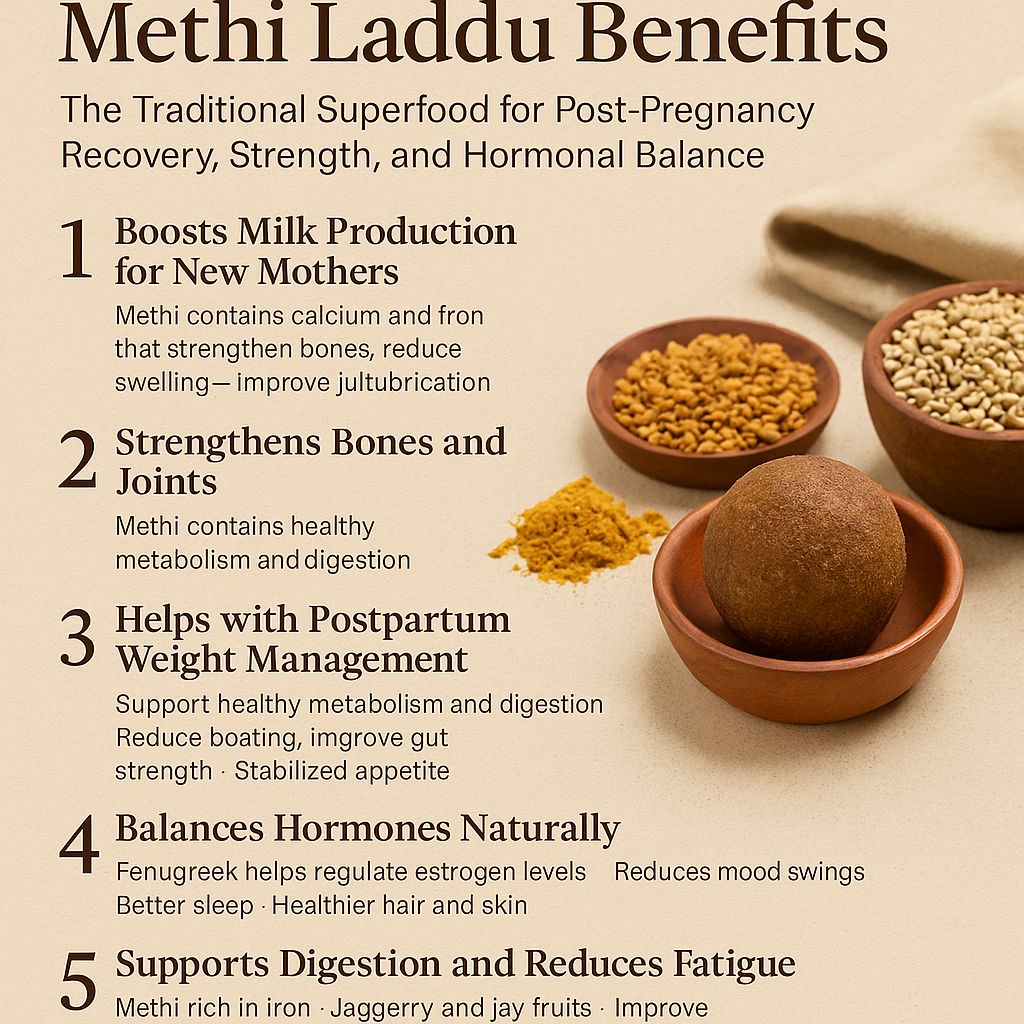
A complete guide to methi laddu benefits, including postpartum healing, lactation support, digestion, hormonal balance, joint strength, and Nuskha’s authentic Ayurvedic laddus.
Read More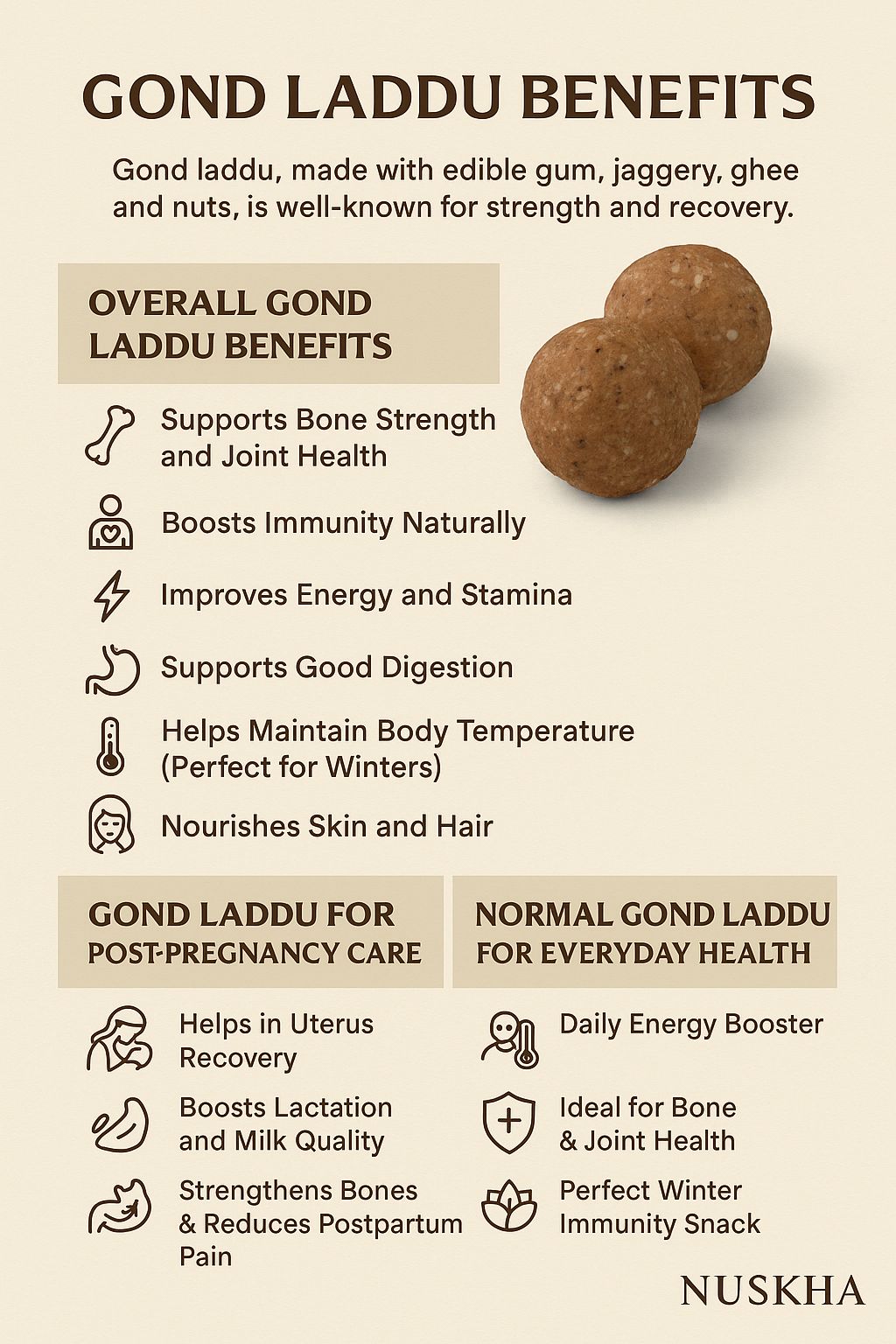
A complete guide to gond laddu benefits, covering both post-pregnancy and general health versions by Nuskha. Learn how gond laddus support strength, immunity, digestion, and postpartum recovery.
Read More
Confused between store-bought mixes and homemade baby food? Here’s why Ayurveda-inspired, natural options like Nuskha’s Poshan range are safer, purer, and more nourishing for your baby’s first foods.
Read More
Motherhood is a journey of transformation, and Ayurveda has guided it for centuries. Discover how ancient wisdom supports every stage, from pregnancy to postpartum, with Nuskha’s natural care.
Read More
Struggling with low milk supply? Ayurveda offers gentle, natural solutions. Explore 7 powerful Ayurvedic foods that help new moms boost lactation and heal, the Nuskha way.
Read More
Winter calls for warmth, nourishment, and immunity. Discover the most powerful Ayurvedic foods that protect your body, boost energy, and bring natural strength, the Nuskha way.
Read More
Postpartum recovery begins with the right nourishment. Explore 5 Ayurvedic foods every new mom should have to regain strength, boost lactation, and heal naturally, the Nuskha way.
Read More
Discover why Gond Laddu is Ayurveda’s ultimate winter superfood, a delicious blend of edible gum, dry fruits, and pure A2 ghee that boosts strength, immunity, and warmth naturally. Handcrafted by Nuskha Kitchen, it’s the perfect balance of taste and wellness for cold days.
Read More
Discover the top 5 Ayurvedic laddoos for strength, energy, and everyday health, handmade with pure ghee, herbs, and ancient Indian wisdom.
Read More
Handcrafted with pure ghee and Ayurvedic herbs, Nuskha’s laddoos bring purity, taste, and wellness together, the perfect festive treat for a healthy Diwali.
Read More
Celebrate Diwali guilt-free with Nuskha’s Ayurvedic sweets - Gond, Methi, Ragi Laddoo, Amla Candy & Gulkand. 100% natural, healthy, and perfect for festive gifting!
Read More
Handmade Ayurvedic laddoos crafted with gond, methi, shatavari, dry fruits & pure ghee – specially made to boost lactation, energy & recovery for new moms.
Read More
Buy Gond ke Laddu Online from Nuskha – handmade with pure ghee, gond & dry fruits. Boosts energy, immunity & strength. Order fresh & healthy laddoos today!
Read More
Nuskha offers Ayurvedic lactation foods, laddoos and powders crafted for new moms. Safe, natural and effective nutrition to boost milk supply and recovery.
Read More
Looking for safe and healthy snacks during pregnancy? Discover the best Indian options like roasted makhana, laddoos, poha, sprouts, idli, and dry fruits. Light, nourishing, and homemade—perfect to satisfy cravings while keeping you and your baby healthy.
Read More
Discover the best food for pregnancy first trimester with Nuskha’s month-wise Ayurvedic guide. From wholesome grains and seasonal veggies to traditional herb mixes, find gentle, preservative-free nourishment for your 1st, 2nd, and 3rd month of pregnancy.
Read More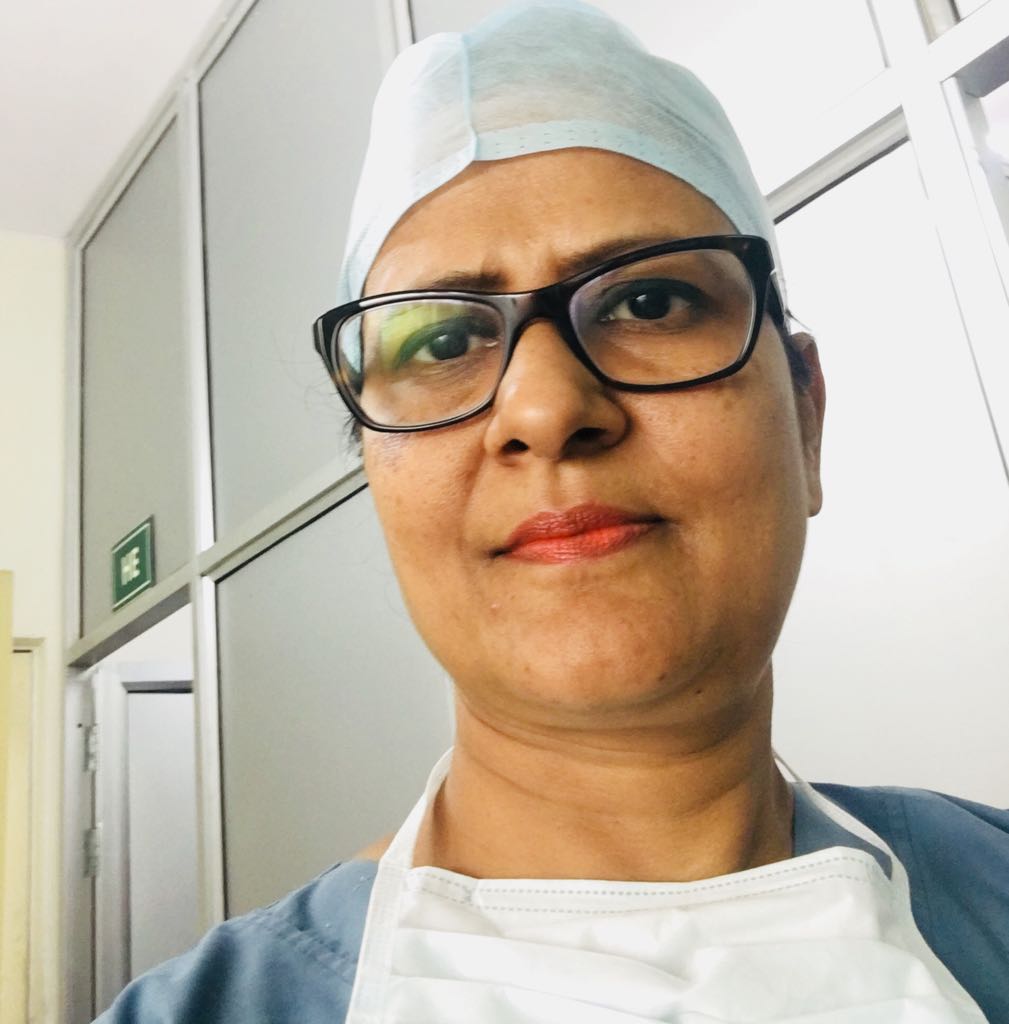
Dr. Nishi Gupta shares her experience recommending Nuskha Kitchen’s Ayurvedic kits for new moms, helping improve recovery, digestion, lactation, and overall wellness post-delivery.
Read More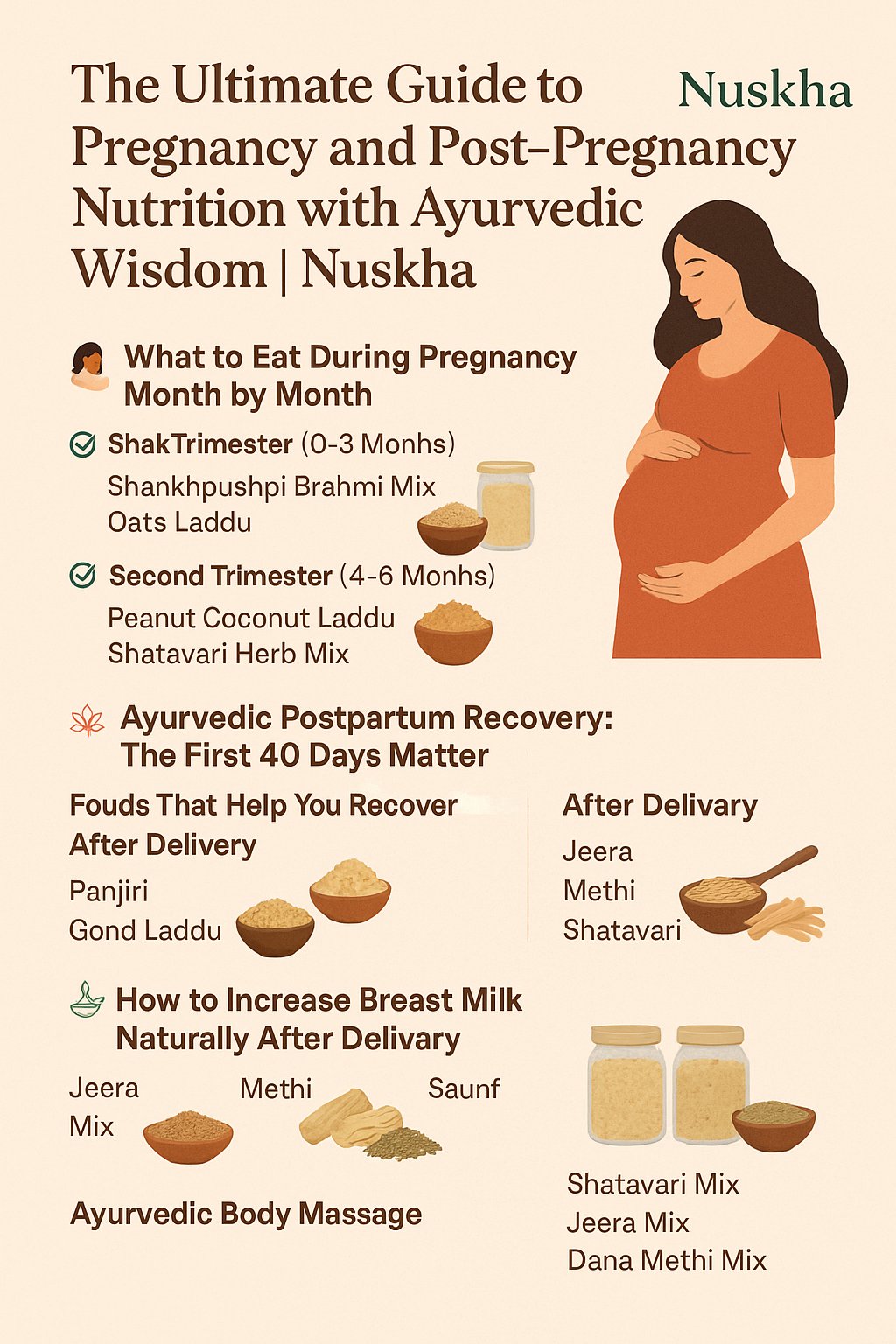
From what to eat in each trimester to Ayurvedic care after delivery, this guide covers everything a mom needs for her pregnancy and postpartum journey.
Read More
Dr. Nirmal Agrawal, Gynaecologist at Anshu Hospital, explains why she prescribes Nuskha's postpartum kits for natural recovery, nourishment, and complete care after delivery.
Read More
A curated guide to the top 5 products every pregnant woman in India should own — from Ayurvedic remedies like Nuskha’s Ajwain Laddu and Stretch Marks Oil to essential daily comforts like prenatal vitamins and maternity pillows.
Read More
With nearly 46 years of practice behind her and a doctorate in the subject, Dr. Aruna specializes in Yog for holistic health and well-being. Her favorite subject is PRENATAL YOG in which she was awarded a doctorate. She has published several research papers in international journals on her prenatal Yog practices and their results. As an Associate Professor at the Poornima University, Jaipur, Dr. Aruna is also a prenatal Yog consultant with Cocoon, a hospital dedicated to pregnancy and childbirth. Dr. Aruna has researched and modified Yog practices that are suitable for the modern girl of the 21st century.
Read More
12 years of a successful and busy practice in Gynecology and Obstetrics,with women having successfully delivered more than 2,000 babies under her care and supervision. Successfully performed more than 12,500 family planning operations. A qualified menopause practitioner, providing best services for menopausal women at Shri Ambe Hospital & Research Centre For Women.
Read More
डिलीवरी के बाद शरीर को ताकत, दूध बढ़ाने और जल्दी रिकवरी के लिए पोषण की जरूरत होती है। जानिए भारतीय माताओं के लिए कौन-कौन से आहार सबसे ज़रूरी हैं, जैसे गोंद के लड्डू, हल्दी वाला दूध, सूखे मेवे और अजवायन-जीरा पानी।
Read More
Discover the most essential postpartum foods for Indian mothers. From Ayurvedic laddoos to healing drinks, here’s what to eat after delivery for faster recovery, better lactation, and lasting strength.
Read More
Wondering what to eat after childbirth? This guide covers traditional Indian postpartum foods, healing tips, and FAQs on breastfeeding, digestion, and recovery.
Read More
एक मां की दिल से निकली चिट्ठी अपनी बेटी के नाम, जो अब खुद मां बन चुकी है। यह पत्र भावनाओं, अनुभवों और पीढ़ियों से चली आ रही परंपराओं से जुड़ा एक अनमोल संदेश है — हर उस मां के लिए जो खुद को अकेला महसूस करती है।
Read More
A deeply personal letter from a mother to her daughter who’s just become a mom. This piece blends emotion, tradition, and modern-day realities — reminding every new mother that she is seen, supported, and never alone.
Read More
The Brahmi herb is a powerful Ayurvedic support for mental clarity, calmness, and better sleep — especially needed during pregnancy and the postpartum phase. Our Brahmi-based formulation is safe, gentle, and ideal for moms experiencing brain fog, restlessness, or emotional fatigue. It supports a peaceful state of mind and promotes a sense of inner balance. Thoughtfully crafted to nurture your mind as you care for your growing baby — naturally and holistically.
Read More
The Shankhpushpi herb is a traditional Ayurvedic ingredient known to support mental calmness, clarity, and restful sleep — especially during pregnancy and postpartum. Carefully included in our pregnancy-safe blends, it helps ease mood swings, forgetfulness, and restlessness without any harsh chemicals. Ideal for expecting moms (after the first trimester) and new mothers looking for gentle emotional support. Backed by centuries of wisdom, now tailored for modern motherhood.
Read More
Nuskha’s Gond ke laddo are a traditional Indian delicacy made specifically for postpartum care. Crafted with edible gond (gum), dry fruits, makhana, jaggery, and desi ghee — these gond laddo are designed to bring warmth and nourishment to new mothers. They’re free from preservatives, refined sugar, and artificial additives, making them a clean, wholesome choice for your recovery journey. Enjoy one laddu daily with warm milk or as part of your post-delivery diet. Rooted in Ayurvedic traditions, these gond laddoo support your healing journey naturally.
Read More
Discover how Nuskha Kitchen, Rajasthan’s first Shark Tank India startup, turned Ayurvedic postpartum care into a national wellness movement — led by a mother-son duo redefining recovery.
Read More
Nuskha’s Shankhpushpi Brahmi Herb Mix is a plant-based wellness blend crafted for pregnancy and postpartum. With ingredients traditionally known for supporting emotional balance, digestion, and relaxation, this gentle mix fits easily into your daily routine—one scoop at a time.
Read More
Nuskha Kitchen – Rajasthan’s First Shark Tank India Startup A mother-son venture rooted in Ayurvedic postpartum care, Nuskha made history as the first startup from Rajasthan to appear on Shark Tank India Season 1. Focused on holistic recovery for new moms, the brand gained national recognition and continues to champion traditional wellness with modern relevance.
Read More
In Ayurveda, Taseer describes the heating or cooling effect of foods on the body. This ancient wisdom plays a vital role in crafting the right Ayurvedic pregnancy diet and post pregnancy diet, ensuring smooth recovery, hormonal balance, and improved lactation. At Nuskha, our range of post pregnancy food options—like postpartum laddus, lactation laddoos, and lactation food powders—is carefully designed to match your body’s changing taseer. We also offer nourishing solutions like stretch marks oil, made from Ayurvedic herbs, to support skin healing naturally. Whether you're in your pregnancy journey or looking for the best post pregnancy care, understanding taseer helps you choose the right foods and products for strength, recovery, and emotional balance.
Read More
Discover Ayurvedic foods and laddus for a healthy pregnancy and post-delivery diet. Explore Nuskha’s nourishing products for pregnancy care, postpartum support, and lactation wellness.
Read More
Nari Kalyan Paak is a traditional Ayurvedic formulation made with ghee, milk, and natural herbs. It’s designed to gently support women’s wellness routines through various life stages, offering nourishing, time-tested care.
Read More
शंखपुष्पी और ब्राह्मी जैसी शक्तिशाली आयुर्वेदिक जड़ी-बूटियों से बना यह हर्ब मिक्स गर्भवती महिलाओं के लिए एक उत्तम आहार है, जो गर्भावस्था के भोजन में मानसिक शांति, संपूर्ण पोषण और ऊर्जा प्रदान करता है। यह गर्भधारण से पहले के आहार के रूप में भी उपयुक्त है, जो शरीर और मन को गर्भावस्था के लिए तैयार करता है। साथ ही, यह गर्भावस्था देखभाल उत्पाद और स्तनपान के लिए लाभकारी भोजन के रूप में माँ और शिशु दोनों के लिए अत्यंत लाभकारी है।
Read More
Nuskha’s Shankhpushpi Brahmi Herb Mix is a natural pre pregnancy product, pregnancy care product, and lactation powder. Perfect for pregnancy food, pregnancy diet, and emotional wellness, it supports every stage of your motherhood journey.
Read More
Explore how proper nutrition and gentle care at every stage—6 to 36 months—can support your baby’s growth, immunity, and overall well-being with Nuskha.
Read More
Explore the benefits of traditional Ayurvedic foods for postpartum nutrition. From nourishing laddus to nutrient-rich powders like Peepal, Shatavari, and Jeera herb mix, along with the wholesome goodness of Panjiri—this guide offers natural options to support new mothers with energy and nourishment after delivery.
Read More
Gulkand is a natural Ayurvedic pregnancy snack and product that aids digestion, cools the body, and seamlessly fits into your pregnancy diet. It’s also an excellent pre-pregnancy snack and food, making it a great addition to your pre-pregnancy routine. Ideal for pregnancy care, Gulkand is a trusted health product that promotes wellness before and during pregnancy.
Read More
It's crucial to look after yourself while looking after a newborn. This time can be busy and a little overwhelming, so think about getting assistance.
Read More
Searching for Pregnancy Yoga Stretches for Back, Hips, and Legs Pain? We get you, girl! Pregnancy is when your body undergoes many changes.
Read More
Nutmeg is a versatile and flavorful spice that has been used in culinary and medicinal applications for centuries. This aromatic spice, which comes from the seed of the nutmeg tree, has a warm, sweet, and slightly nutty flavor that is used in a variety of sweet and savory dishes.
Read More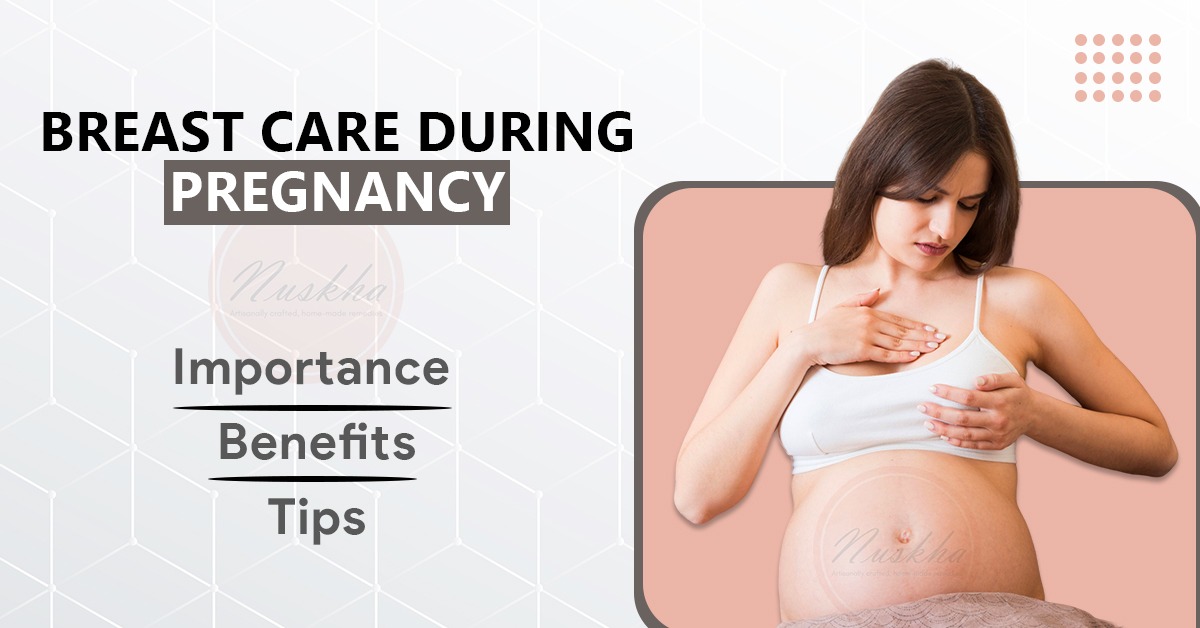
Importance of breast Care During Pregnancy
Read More
“गर्भवती होने का अर्थ है जीवन्त रूप से जीवित, पूरी तरह से स्त्री, और व्यथित रूप से आबाद होना। आत्मा और आत्मा - शरीर के साथ-साथ गर्भावस्था को संक्रमण, विकास और गहन शुरुआत का समय बनाते हैं। “ऐनी क्रिस्चियन द्वारा बोला गया ये वाक्य एक स्त्री के जीवन के सबसे बड़े सुख भरे पलों को दर्शाता है |
Read More
Growing a human can be difficult and exhausting, and doing a job during pregnancy can add to exhaustion. Even though it is difficult, women all across the globe still manage to continue their job while pregnant.
Read More
The ayurvedic diet has had a long history of providing comprehensive care for pregnant women. This is the time to focus on getting an ayurvedic diet designed to nurture your health, known as Garbhini Massnumssika Pathya, i.e., pregnant women's every-month wholesome diet.
Read More
Postpartum nursing care is an essential part of the new mother's journey. While giving birth to a child is a momentous occasion, it tremendously affects the woman's mental and physical well-being.
Read More
Traditional meals are advised during and after pregnancy to help women recover and receive essential nutrients. These foods are often cooked in alternative ways and consumed based on the location and the expectant mother's preferences.
Read More
Going to be a mom soon? Do you desire to be a "fitter and healthier you" during pregnancy? Being active and exercising during pregnancy is vital if you are up for a faster recovery and shorter labor time.
Read More
Some moms can't wait to start working out again after having a baby. But you can't just hop on the treadmill or return to the pilates classes you took before you had a baby.
Read More
There are many good things about massaging a baby. With each soft touch, your baby will feel cared for and loved, which will make the bond between you and your baby stronger.
Read More
Are you pregnant? Have you been constantly thinking about how your birthing experience is going to be? How painful it is going to be? Will you be able to handle it? Of course, yes! Every woman is capable of birthing naturally because that is how a woman’s body has been created by God.
Read More
Pregnancy is a tough time; it may leave you feeling exhausted as your body is busy creating a human being. As much as it is important to rest so is to remain active by engaging yourself in light physical activities. Being active not only helps you in dealing with mental and physical stress but also prepares your body for a natural delivery.
Read More
Your little bundle of joy has arrived and you just can’t take your eyes off him/her, right? Every pregnancy is different and has its ups and downs, holding a healthy baby in your arms is like being successful after facing all the challenges.
Read More
Postnatal which is also known as Postpartum is relating to the period after childbirth. This period begins immediately after the birth of a baby and defined as the first 6-8 weeks after birth.
Read More
लेकिन एक चीज़ है जो हमे सबसे अलग बनाती है। रसायन वेद के अनुसार, यदि उचित मार्गदर्शन में, संतुलित अनुपात में सही सामग्री के साथ और प्रक्रिया और घटकों की शुद्धता पर अत्यधिक सावधानी का ध्यान रखते हुए बनाया जाये तो नारी कल्याण पाक सोने की तुलना में अधिक कीमती है।
Read More
Post pregnancy time which is also known as postpartum or postnatal period begins after the child birth. A new mother body changes a lot after giving birth, the new mother’s health becomes weak due to the loss of fluid and blood. First 6-8 weeks after child birth are defined as postnatal period.
Read More
प्रसव के बाद में महिलाओ को अपने खान-पान का विशेष ध्यान रखना होता हैं, प्रसव के बाद जिन महिलाओ ने खान-पान का ध्यान नहीं रखा, उनको अपने जीवनकाल में काफी परेशानी का सामना करना पड़ता हैं| जो महिलाए प्रसव के बाद खान-पान का ध्यान रखती हैं, वो पूर्णतया स्वस्थ एवं सुडौल रहकर अपना जीवन जीती हैं|
Read More
Don’t feel like eating during pregnancy first trimester? Pregnancy is tricky, it is a roller coaster ride comprising different emotional and physical challenges. It changes the normal way of living in numerous ways starting from sleeping patterns, body structure, and a lot more. But one of the known changes that women face is sudden food aversion and nausea.
Read More
A cute smile, shining eyes, little hands, and tiny feet are what you must be waiting to see, isn’t it? Pregnancy is a beautiful experience with every moment being special in its way, especially for the mother. This is the time when a woman needs extra care, healthy food, and a balanced lifestyle. Even a little bit of overdoing something can instantly them feel uneasy.
Read More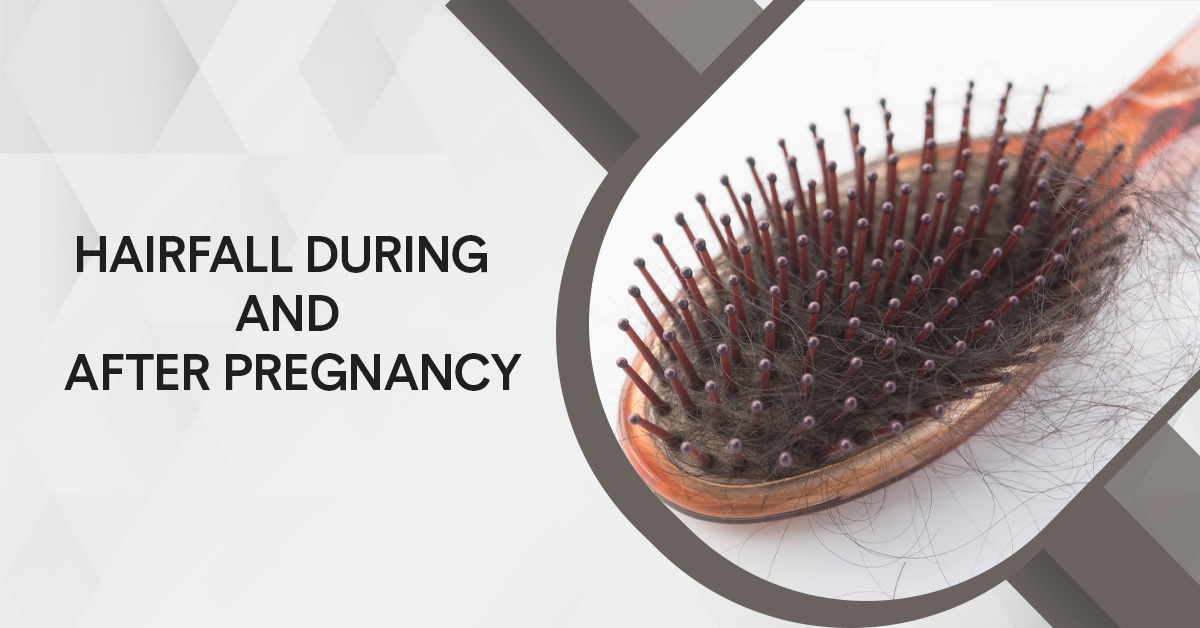
Hair is one of those human features that naturally make them look beautiful. It is a normal belief that during pregnancy women’s hair becomes long and lustrous. But as every coin has two sides, so does pregnancy. Every woman goes through hormonal changes during this phase of nine months causing alternations in the normal way of living.
Read More